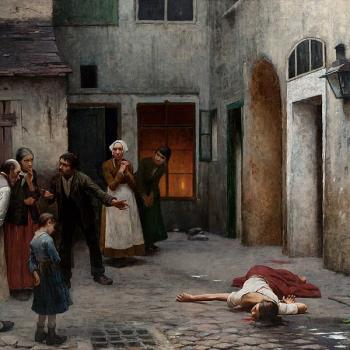
Four score and seven years ago our fathers brought forth on this continent, a new nation, conceived in Liberty, and dedicated to the proposition that all men are created equal.
Now we are engaged in a great civil war, testing whether that nation, or any nation so conceived and so dedicated, can long endure. We are met on a great battle-field of that war. We have come to dedicate a portion of that field, as a final resting place for those who here gave their lives that that nation might live. It is altogether fitting and proper that we should do this.
But, in a larger sense, we can not dedicate — we can not consecrate — we can not hallow — this ground. The brave men, living and dead, who struggled here, have consecrated it, far above our poor power to add or detract. The world will little note, nor long remember what we say here, but it can never forget what they did here. It is for us the living, rather, to be dedicated here to the unfinished work which they who fought here have thus far so nobly advanced. It is rather for us to be here dedicated to the great task remaining before us — that from these honored dead we take increased devotion to that cause for which they gave the last full measure of devotion — that we here highly resolve that these dead shall not have died in vain — that this nation, under God, shall have a new birth of freedom — and that government of the people, by the people, for the people, shall not perish from the earth.
Abraham Lincoln
November 19, 1863
Can the Republic survive a federal government and a Supreme Court that is both corporatist and nihilist?
That is the question.
The United States Supreme Court has been waging a successful war on government of, by and for the people for several decades now. Roe v Wade and Obergefell v Hodges bookend an almost 50-year-old judicial bypass of democracy and the democratic process.
In both instances, the Supreme Court jumped into an arena where the democratic process was working very well. The Court slashed through the democratic process, ending it abruptly and disastrously. The democratic process was dealing with the question of legal abortion in the always-messy, always-effective way that is democracy in action. One state would legalize abortion in certain circumstances, another state would tighten abortion restrictions. The first state would revise its abortion laws again, and a third state would decide to legalize.
It would have taken time, but the democratic process was working this out according to the will of the people. There is no doubt that, if the Court had allowed the process to work, it would have worked. What we would have ended up with would have been a much more just and — this is crucial — culturally-agreed-upon solution. Our laws would have reflected the will of the people, and for that reason, they would have stood. There would have been a lot of electioneering and speechifying, but there would have been no destructive culture war and the resulting breakdown of the body politic which we have seen since Roe.
The Court, by injecting itself into a healthy, working democratic process, and arbitrarily ending that process by the use of the brute force of fictional “findings” in the Constitution, created an on-going Constitutional crisis such as this country had not seen since the Civil War. Flash forward 50 years, and we arrive at Obergefell v Hodges.
Yesterday’s Supreme Court decision was another slam-dunk of the democratic process on an issue that was being debated and legislated over time. There is no doubt that the democratic process would have resolved this issue had the courts stayed out of it. It would have taken time, and again, it would have been messy. But the end result would have been a solution that We the People accepted and that would not have damaged this country.
The DOMA decision of two years ago set the lower courts on their domino effect overturning of state statutes pertaining to the definition of marriage. That allowed the Supreme Court to do exactly what it intended when it overturned DOMA, which was to issue a draconian ruling. Yesterday’s decision was a judicial one-two punch. Anyone with half a brain could see that the issue had been decided when the Court set up the DOMA decision in the first place.
I suppose the lessons of Roe are why they decided to take this backdoor route to legislating from the bench. That, and the opinion polls which gave them the entirely false notion that they were acting in a manner that the public would accept.
Roe and Obergefell bookend tragic overstepping by the Supreme Court that have done and will do incalculable damage to the Republic. Roe shoved into the Constitution the legal fiction that some human beings are not in fact human and their lives have no value under the law. Obergefell destroys marriage as a legal construct. It enshrines cultural nihilism in the 14th Amendment and sets the Constitution on a collision course with itself.
Obergefell inevitably places the Supreme Court in the position of legislative arbiter on the limits and allowances of all manner of American freedoms which we have held dear and fought wars to preserve since this nation’s founding. We are going to see the Court’s ham-handed fine-tunings of the Bill of Rights on a plethora of challenges that will come from yesterday’s ruling. Each one of these subsequent rulings will do damage to American freedoms. Every ruling will limit the rights of We the People and will strengthen the Court’s power as a legislative body with dictatorial powers and no checks and balances.
Notice that I said that the yesterday’s ruling places the Supreme Court as the legislative arbiter. Obergefell is so destructive to the democratic process that it will inevitably remove whole areas of the law from the democratic process and place them entirely in the hands of the Court. The ruling is so nihilistic that it creates an arbitrary legal option for nihilism in future proceedings.
The Supreme Court has set aside democracy.
I mentioned corporatism a few paragraphs back. I am aware that my concern about corporatism confuses many Public Catholic readers. But corporatism, as practiced in America, is government, working entirely for multinational corporations who are like parasites draining every bit of economic vitality out of this country. Corporatism is not only a grave evil, it is the absolute enemy of the Republic.
These twin evils — corporatism and nihilism — are the underlying principles behind many of the Supreme Courts decisions in the past 10 years. The Supreme Court has become anti-democracy and subservient to corporatism.
The Court is not the only institution which serves corporatism and nihilism. Our legislative process is also poisoned by these twin evils, which are, at their root, very similar. Corporatists and nihilists share an absolute contempt for the will of the people. They are bedfellows in their parallel goal of side-stepping and annihilating the democratic process.
Their best friend in this is the United States Supreme Court.
The Court destroyed marriage as a legal entity yesterday. It also created a plethora of avenues by which basic American freedoms can be destroyed.
Advocates of gay marriage may themselves come to rue this decision. It will take time before that happens. A lot of tragedy and excess will have to play out before things get so ripe that everyone can smell the rot. But to the extent that gay marriage advocates value marriage and were simply trying to acquire the good of it for themselves, they have failed. Instead of buying the house, they burned it down.
The question before us is a relatively straightforward one, and the answer, at least to me, is equally straightforward. Can the Republic survive a Supreme Court that is both corporatist and nihilist?
The answer is no.
America may, as Rome did, go on as a great military power long after the Republic is dead. But democracy cannot survive if its own government turns on it and shuts it down. Corporatism, if we do not stop it, will be the death of democracy.
Nihilism, on the other hand, is such an unworkable social construct that it cannot govern at all. No society can survive as a nihilistic society. America will not go on as a great military power shorn of its democracy if nihilism prevails. America will fail horribly and fall into a debacle of ruin if it is governed by the forces of nihilism.
Nihilism and corporatism are very similar. Corporatism, is, at its root profoundly amoral. Nihilism is, at its root, profoundly anti-human.
American civilization was so strong that it has taken these blows and kept on walking. But the Republic cannot operate forever under the governance of corporatism and nihilism. America can be destroyed, not from without, but by the corruption of its institutions.
That is exactly what we are facing with our corporatist/nihilist Supreme Court and its ugly war on government, of, by and for the people.
For other thoughts on Obergefell v Hodges, read what Kathy Schiffer, Simcha Fischer, Pia de Solenni, Jane the Actuary, Father Michael Duffy, Frank Weathers, the Anchoress and Deacon Greg have to say.













